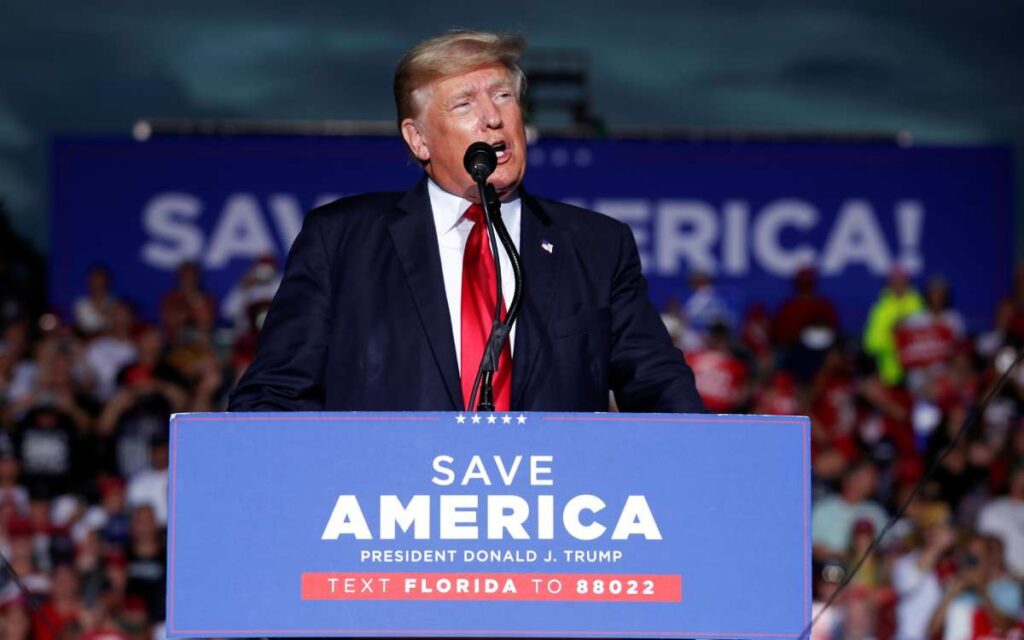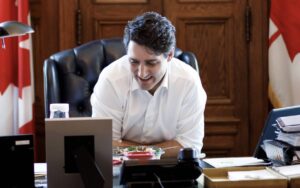
Political junkies would like to see a horserace. But we’re more likely to see what a gust of wind does to a house of cards. In 2024’s GOP presidential race, Iowa may be the starting gate and the finish line. Photo Credit: Reuters/Octavio Jones.
On Monday, expect voters in Iowa to confirm what polls have been saying for months. Donald Trump stands alone atop the GOP political mountain. Persuading anyone differently in the MAGA crowd personifies futility. Any honest reading of the evidence suggests they are right. As a matter of record, Trump has an excellent chance of winning Iowa and New Hampshire and sailing to the nomination.
There’s no reason to doubt the polls. The Real Clear Politics betting odds tracker indicates Trump has a 73 per cent chance of being the nominee. About a year ago, his chances were under 30 per cent. With indictments piling up, the threat of jail time increasing, and the Biden Administration and media pooling their resources together, Trump has managed to not only stay afloat but double his support and more. What explains this phenomenon? And what can we expect on Monday in Iowa?
In an earlier article, I referred to the 1892 election as the most recent example of what will likely happen in 2024. An incumbent president, Benjamin Harrison, faced off against former president Grover Cleveland in a rematch of 1888. Why has it taken so long for this to happen again? Throughout the early 20th century, there were examples of losing candidates attempting to run again. William Jennings Bryan stood as the Democratic standard-bearer in 1896, 1900, and 1908, never coming close to winning. Thomas Dewey twice led the GOP in 1944 and 1948. Adlai Stevenson headed the losing Democratic effort in 1952 and 1956. Richard Nixon successfully overcame the loser tag, leading the party to defeat in 1960 but winning twice, in 1968 and 1972. But no former president has brought his campaign speeches out of retirement to run again since 1892.
The only glimmer of this occurred in 1980 when Gerald Ford, who had lost a very close election to Jimmy Carter in 1976, mused about entering a race that his 1976 rival for the nomination led. Once his wife Betty reminded him that his golfing and skiing time would take a hit, he reconsidered. Later that summer, Ronald Reagan and Ford toyed with the idea of a co-presidency that not even Henry Kissinger could negotiate. All that is to say, Trump’s re-emergence as the favourite to win his party’s nomination demonstrates imagination. The kind of imagination that few politicians have been bold enough to employ. He is imaginative because he does not obey the rules. He makes deep connections with his supporters, but he thinks beyond the staid rules of the political machinery.
As John Podhoretz commented on the Commentary podcast of January 4th, “I had thought in 2002 or 2003 the person who should have run in the Democratic Party for the presidency in 2004 was Al Gore. And that Al Gore had a plausible claim even then that he had won the election. Certainly, the election was tied. And that nothing that he had said or done or been on the election trail would have discredited him as a candidate again. He was the most famous politician in America, aside from George W. Bush. A lot of people thought he had been robbed. And he had a credible counter story.”
Podhoretz goes on to explain that Gore could have said Bush mishandled 9/11. He could have claimed he knew how to deal with these terrorists, and further, he would not have bungled Iraq trying to exact revenge for the sake of his father. As Podhoretz concludes, “One thing you can say about Al Gore. He was an incredibly unimaginative politician. And he did not see this… Gore, but for a flip of a coin, would have been president in 2001.”
Bush only won in 2004 because of one state: Ohio. If Ohio had gone the other way, the Democratic nominee would have been president. Gore, with any imagination, could have come back like Nixon and reclaimed the White House. Trump did not need to go away and make money from hedge funds. He could have retired to Mar-a-Lago, but he likes to remake himself. Trump has been an author, a commissioner, an entertainer, a host, and a politician. He sits on the verge of doing something not accomplished since the 19th century. He has a first-rate political imagination that few have possessed.
That brings us to Iowa. In the latest average of polls, Trump leads the pack with 51 per cent. Florida Governor Ron DeSantis and former United Nations Ambassador Nikki Haley combined have 36 per cent. The caucus vote counting follows an unconventional rulebook. First, voters must attend in most cases, and the event occurs in the evening. Beyond that, there are several steps. As Robert Yoon reports for AP, “The binding presidential vote functions essentially like a party-run primary, only with very limited polling hours and no accommodation for absentee voting, except for a tiny handful of overseas and military voters. There are speeches on behalf of various candidates before the voting. Individual caucus chairs are allowed to exercise some discretion in how to conduct the vote, but the voting is done by secret ballot and there is no set list of candidates. Voters must be given the option to vote for any candidate they choose.” Additionally, each candidate earns delegates based on the final tally. It is not a winner-take-all proposition.
DeSantis has visited all 99 counties in Iowa and received heavy-weight endorsements from Iowa Governor Kim Reynolds and a leading social conservative activist. Haley has been rising in the polls. The race is Trump’s to lose because he could win the delegate count but lose the expectation game. If Trump falls below 50 per cent, that would be an unpleasant development for his campaign but not a big problem. He would face trouble if he fell below 45 per cent and either of his opponents hit 30 per cent. Falling below 40 per cent, with either DeSantis or Haley getting within five to seven points, would elevate New Hampshire to a battleground state.
The possibility that any of these scenarios unfolds ranks as improbable. But any shift in the present condition of the race leaves the remaining contests unpredictable. Momentum can move a race and open doors previously shut. Regardless, Trump holds the cards at this point. South Carolina and the states that follow will likely deliver solid victories and most of the delegates he needs to clinch the nomination early.
Come Monday night, Trump will either be preparing for a coronation or a confrontation. Assuming the accuracy of the polls, he can get fitted for the GOP crown. The talk will turn to vice-presidential nominees and running mates. A DeSantis surprise may delay the coronation but not prevent it. A second-place finish for Haley that tops 25 per cent appears the only way this race could detour. DeSantis and Haley will hold town halls and debates this week, but this looks like the opening act to the headliner.
Trump will swagger into the state, blow away any opposition, suck up all the energy, light up a rally of thousands. The months and money his opponents have spent in the Hawkeye state will look as impotent as a match in a tsunami. Political junkies would like to see a horserace. But we’re more likely to see what a gust of wind does to a house of cards. In 2024’s GOP presidential race, Iowa may be the starting gate and the finish line.

Dave Redekop is a retired elementary resource teacher who worked part-time at the St. Catharines Courthouse as a Registrar until being appointed Executive Director at Redeemer Bible Church in October 2023. He has worked on political campaigns since high school and attended university in South Carolina for five years, earning a Master’s in American History with a specialization in Civil Rights. Dave loves reading biographies.




















